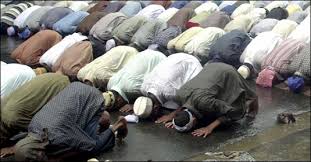
Many view religion- and particularly a faith such as Islam- in terms that are a bit misleading. It's not an ideology in the minds of many of us, but rather [A] A personal or ethnic identity marker. 'This is what my parents were, so I am as well'. [B] A way to address or even escape life and its varied hardships and responsibilities. [C] As a way to be distinct from others, allowing isolationism.
The above mentioned reasons and others not mentioned here are often highlighted-in many ways inaccurately- by elements of the media to explain the rather phenomenal spread of Islam, particularly among Women and the Middle Class in The USA, UK, etc..! Oftentimes, Islam's spread is presented as something strange, like a virus that has to be stopped at all costs, attacking the weak and vulnerable in society, those unable to deal with 'normal' life, education, money, the opposite sex, etc..at nausea.
This particular thread of propaganda became most apparent to this writer while watching an episode of Law and Order. In this episode, a woman's rights activist is killed by a young Muslim convert [who sports a beard, Kufi and Jalabiyyah] for 'blaspheming Islam'. of course, he is captured by the authorities, and while acting as his own attorney, attributes his crime to 'defending Islam' from attack. His problems with women become apparent in his dealings with the female Judge and Prosecutor and informs his audience "Allah made men superior to women" and that "American women walk the streets of our holy cities with faces unveiled". The clip below is suppose to be an analysis of his 'condition'.
His 'condition' is used against him, digging up an old girlfriend, the prosecutors threaten to use the relationship against him, compelling him to accept a guilty plea and the sentence.
The reality of conversion [or 'reversion'] is very different for most people. That is not to say that there are not people out there who accept Islam [or any other religion] for escapism or some other mental need, but in general what attracts people to Islam is its intellectual appeal. It does not demand or expect blind faith and obedience. The Qur'an and Hadeeth literature both encourage the seeking of knowledge as a prerequisite of faith and devotion, points to creation itself as a sign of God's power and existence, and is itself not based on "miracles". There is no one to die for your sins or create wine from water, it places great emphasis on personal responsibility and accountability.
In any case, we wish to explore a bit as to the purpose of religion.
Purpose: for Allah alone.
A very succinct Quranic sentence tells us "Religion is exclusively for God" [Ala Lillahid deenul Khaalis] [Q 39:3]. There is no mention of using a religion to rebel from one's parents or to seem 'hipe'. This sentence tells us that when we accept religion or embrace religion, we do so because we believe it to be the path God has blessed with correct guidance. We follow it because we have been intellectually convinced of the veracity of its claims, that it will teach us about God, God's will for our lives, in short, how to properly conceptualize God.
But what else does the statement "For God" mean? We also say things like "In the cause of God" [Fee SabeeLillaah]. When we observe prayer, we say we do it "For God the most high" {Lillaahi Ta'alaa}. What do all these phrases mean?
To understand that, we have to understand that God does not need our prayers, nor our fasting. He does not need us to feed him [Q 51:57]. So, when we say "for God" we need to understand that after conceptualizing the Divine in the correct manner, as outlined in the Qur'an [ft.1], we become obligated to act correctly. By adopting the lifestyle and worldview that is asked of us by God, by abandoning racism, classism, or any other sort of negative 'ism'.
'A'ishaa bint Abi Bakr [Radee Allahu 'Anha] spoke of Muhammad, her husband and the Last Prophet, in a beautiful way. She was asked about his character, and she responded with "His character was the Qur'an [Kaana Khuluquhul Qur'aan].
If we accomplish this, internalization of the word of God, then these sorts of neorisis would disappear. When we say we should apply the Islamic teachings, we mean to say that all of the Islamic teachings should be applied, rather than selective.[Ft.2]
To accept Islam, we don't have to hate America, or to hate Christians or other peoples. We don't have to become bad copies of other people and forget our own histories and backround. To be a Muslim, we simply have to recall the following succinct Quranic verse:
Say:Surely, my prayers, my devotional acts, my life and death are all for Allah, the Nourisher of the Universe" [Q 6;163].
Footnotes
[1] See for example our article on Ayatul Kursiyy [The Divine throne] .http://shamsuddinwaheed.blogspot.com/2008/01/divine-throne-examination-of-ayatul.html
[2] This writer was once told by a non-practicing Muslim that if he saw his sister without Hijaab, he would "without hesitation put a bullet in her head". The irony in this statement is two-fold. [A] The dress code, whose interpretation is widely disputed today, is only mentioned twice in the Qur'an [33:59 and 24:31] whereas Prayer and charity has been mentioned perhaps hundreds of times, and [B] The Qur'an does not impose a death sentence for altering dress, only for murder [17:35] and creating social chaos [5:33]